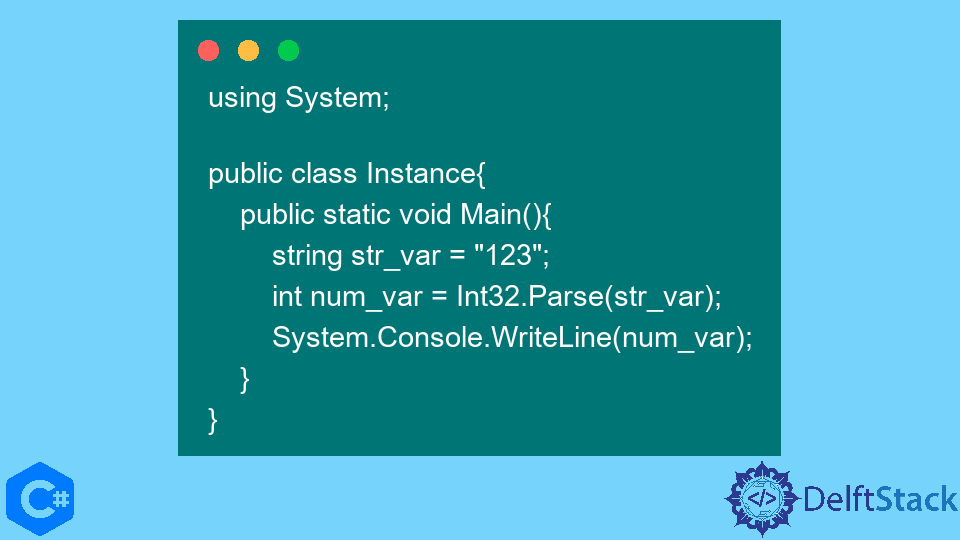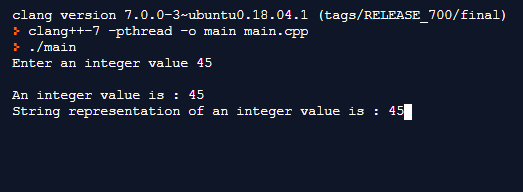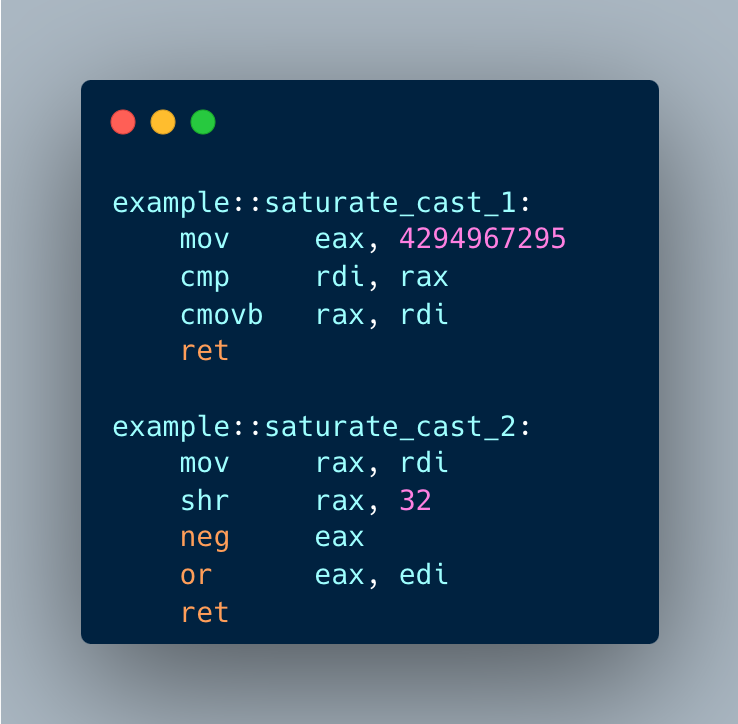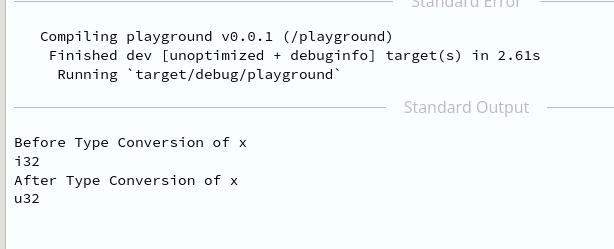Convert String To Int Rust
Parsing a String into an Integer in Rust
When working with user input or external data, it is often necessary to convert a string representation of a number into its corresponding integer value. Rust provides several methods and techniques for parsing strings into integers, each with its own advantages and considerations. In this article, we will explore the process of converting a string to an integer in Rust, covering common scenarios, handling potential errors, different number formats, numeric overflow, whitespace, non-numeric characters, negative numbers, custom parsing, and important considerations.
Checking for Valid Integer Values
Before attempting to convert a string to an integer, it is important to verify whether the string actually represents a valid integer value. This is necessary because trying to parse an invalid string can lead to runtime errors. Rust offers a convenient method called `parse()` for this purpose.
Using the `parse()` Method for Integer Parsing
The `parse()` method is available for all types that implement the `FromStr` trait, including the integer types like `i32`, `u64`, etc. It takes a string as input and attempts to parse it into the desired integer type. If successful, it returns a `Result` type, either an `Ok` variant with the parsed integer or an `Err` variant with an error message in case the string was invalid.
Handling Invalid Input Gracefully
In cases where the parsing fails due to invalid input, it is crucial to handle the error gracefully. This includes notifying the user or taking appropriate actions based on the specific requirements of your program. Using pattern matching on the `Result` type allows you to handle both successful and failed parsing scenarios effectively.
Handling Different Number Formats
Rust also provides built-in support for parsing different number formats, including decimal, binary, hexadecimal, and octal. By using the `from_str_radix` function, you can specify the base (or radix) of the number format and parse the string accordingly. This allows you to handle non-decimal numbers with ease.
Working with Numeric Overflow
It is important to be aware of the size limitations of integer types in Rust, as attempting to parse a number that exceeds these limits can result in numeric overflow. Rust provides the `Result` type to handle potential overflow cases during parsing. By checking the `Result` variant, you can detect if an overflow occurs and take appropriate actions accordingly.
Handling Leading and Trailing Whitespace
User input can often contain leading or trailing whitespace characters, which should be ignored during the parsing process. Rust provides methods such as `trim()` to remove leading and trailing whitespace from a string. By applying this method before parsing, you can ensure that unnecessary whitespace does not interfere with the conversion process.
Dealing with Non-Numeric Characters
Sometimes, user input may contain non-numeric characters. In such cases, it is important to handle these characters appropriately or alert the user of invalid input. Rust provides various methods like `chars()` and `is_numeric()` to iterate over the characters of a string and check if they are numeric or not. By ignoring non-numeric characters during parsing, you can ensure accurate conversion results.
Handling Negative Numbers
Converting negative numbers from string representations requires special attention. Rust allows you to handle negative numbers by including the sign symbol (“-“) in the string. When parsing a negative number, you need to properly handle the sign symbol and alert the user if an invalid negative number input is encountered.
Customizing Numeric Parsing
In certain scenarios, the default parsing behavior provided by Rust may not be sufficient. In such cases, you can implement your own custom parsing logic to accommodate specific requirements. Rust provides the `FromStr` trait, which allows you to define custom parsing functions for your types. Additionally, the `from_str_radix` function can be used to parse numbers using a specific base or radix.
Final Thoughts
When converting a string to an integer in Rust, it is essential to consider various factors such as error handling, different number formats, numeric overflow, whitespace, non-numeric characters, negative numbers, and customization needs. Striking a balance between efficiency and accurate parsing results is crucial, so thorough validation techniques and error handling mechanisms should be implemented. By following the guidelines and techniques discussed in this article, you can successfully convert strings to integers in Rust and ensure the reliability of your programs.
Convert to string rust, Vec
To convert a `Vec
3. How do I take input as a number in Rust?
To take input as a number in Rust, you can use the `std::io` module to read user input from the standard input stream. You can then parse the input string into the desired numeric type using the `parse()` method or other specialized parsing functions based on your requirements.
4. How can I convert a `usize` to an `i32` in Rust?
To convert a `usize` to an `i32` in Rust, you can use the `as` keyword followed by the desired target type. For example, if `num` is a `usize` variable, you can convert it to an `i32` by calling `num as i32`. Keep in mind that this conversion may result in a potential loss of data if the `usize` value exceeds the maximum value representable by `i32`.
5. How can I parse a string in Rust?
To parse a string in Rust, you can use the `parse()` method available on types that implement the `FromStr` trait, including the integer types. This method takes a string as input and attempts to parse it into the desired type. If successful, it returns a `Result` type with the parsed value.
6. How can I work with string types in Rust?
Rust provides the `str` type, which represents a string slice, and the `String` type, which represents a mutable string. You can perform various operations on strings such as concatenation, slicing, iterating over characters, and converting between different string types using the provided methods and traits.
7. How can I declare and use variables in Rust?
In Rust, variables can be declared using the `let` keyword, followed by the variable name and an optional type annotation. For example, to declare an integer variable named `x`, you can write `let x: i32 = 42;`. Variables in Rust are immutable by default, but you can make them mutable by using the `mut` keyword, like `let mut x: i32 = 42;`. Once the variable is declared, you can use it within the scope where it is defined.
8. How can I convert bytes to a string in Rust?
To convert bytes to a string in Rust, you can use the `String::from_utf8_lossy()` method as mentioned in the previous question. This method allows you to convert a byte slice (`&[u8]`) to a string, replacing invalid UTF-8 sequences with the Unicode replacement character.
Rust Convert Strings To Integers, If Else Statements | Rust Programming | Kovolff
Keywords searched by users: convert string to int rust Convert to string rust, Vec Categories: Top 46 Convert String To Int Rust See more here: nhanvietluanvan.com Introduction Rust is a modern systems programming language that provides memory safety, concurrency, and efficiency. Strings are an integral part of any programming language, and Rust offers powerful tools to manipulate and convert them. In this article, we will explore how to convert various data types to strings in Rust, along with some frequently asked questions to help you gain a deeper understanding of this topic. Converting Primitive Types to Strings Rust provides the `to_string` method for many primitive types such as integers, floats, booleans, and characters, making it straightforward to convert them to strings. For example: “`rust Here, the `to_string()` method converts the `number` variable from an `i32` (32-bit signed integer) to a string. Similarly, other types can also be converted using this method. Converting Custom Types to Strings To convert custom types to strings, Rust utilizes the `ToString` trait. By implementing this trait, you can define how your type should be converted to a string. Consider the following example: “`rust impl ToString for Person { let person = Person { let person_string = person.to_string(); In this example, the `Person` struct implements the `ToString` trait, allowing us to define a custom way to convert it to a string. The `to_string` function is overridden and uses the `format!` macro to create the desired string representation. Converting Enum Variants to Strings Enums in Rust can also be converted to strings. The `std::fmt::Display` trait provides the necessary functionality to achieve this. By implementing the `Display` trait, you can define a string representation for each variant of the enum. Here’s an example: “`rust use std::fmt; impl fmt::Display for State { let state = State::Active; In this code snippet, the `fmt::Display` trait is implemented for the `State` enum. The `fmt::fmt` function is overridden and uses the `write!` macro to format the string representation based on the enum variant. FAQs Q1: Can I convert a string to an integer in Rust? Q2: How can I convert a string to a float in Rust? Q3: Can I convert a boolean to a string in Rust? Q4: Are there any performance considerations when converting to strings? Q5: Can I customize the string representation of a struct in Rust? Conclusion In Rust, converting data types to strings is straightforward and flexible. By utilizing the `to_string` and `ToString` methods, along with implementing the `std::fmt::Display` trait, you can easily convert primitive types, custom types, and enum variants to strings. Additionally, Rust provides methods like `parse` to convert strings back into their respective data types. Understanding these conversion techniques gives you the ability to manipulate and represent data effectively within your Rust programs. Understanding Vec Before delving into the conversion process, let’s first understand the types involved. In Rust, `Vec Converting Vec The simplest way to convert a `Vec Here’s an example usage of `String::from_utf8`: “`rust In this example, the given byte vector represents the ASCII characters of “Hello.” We call `String::from_utf8` with `bytes` as the argument and store the result in the `string` variable. We use `expect` to handle potential errors by printing a custom message if the byte vector isn’t a valid UTF-8 sequence. Finally, we print the converted `String`. Handling Invalid UTF-8 Sequences: It’s crucial to handle cases where the byte vector contains invalid UTF-8 data. In such situations, `String::from_utf8` will return `Err`, indicating the presence of invalid byte sequences. Rust provides multiple ways to handle invalid UTF-8 data, such as replacing or ignoring the invalid parts. You can use the `String::from_utf8_lossy` function instead of `String::from_utf8` to handle these scenarios. `from_utf8_lossy` replaces invalid sequences with the Unicode replacement character (U+FFFD). Here’s an example: “`rust In this example, we intentionally define a byte vector containing an invalid UTF-8 sequence. The `from_utf8_lossy` function takes a reference to the byte vector and returns a `Cow Frequently Asked Questions: Q1. Can I convert a `Vec “`rust Q2. What happens if I convert a `Vec Q3. How can I convert a `Vec Conclusion: Converting a `Vec Rust is a systems programming language that provides the performance of low-level languages like C and C++ while guaranteeing memory safety. It is known for its focus on safety, speed, and concurrency. In this article, we will explore the input number functionality in Rust and discuss how it can be used efficiently in your Rust programs. Rust offers a variety of methods to input numbers, allowing developers to handle different scenarios effectively. Let’s dive into the details of these methods and understand how they can be utilized in Rust programming. 1. Standard Input “`rust fn main() { let mut input = String::new(); let number: i32 = input.trim().parse().expect(“Please enter a valid number”); println!(“You entered: {}”, number); In this example, we use the `read_line()` function to read input from the standard input stream and store it in a mutable string variable called `input`. We then use the `parse()` method to convert the input into a desired type, in this case, an `i32` (a 32-bit signed integer). If the user provides an invalid input, we handle the situation gracefully by displaying an error message. 2. Command-Line Arguments “`rust fn main() { println!(“You entered: {}”, number); In this example, we use the `env::args()` function to collect the command-line arguments and store them in a vector called `args`. We then access the desired argument using indexing and parse it into an `i32`. We handle the situation where the user does not pass a valid argument with a graceful error message. FAQs: Q1. How can I handle input validation in Rust? Q2. Can I input numbers other than integers? Q3. How does Rust handle unexpected or malicious input? Q4. Are there any performance considerations when inputting numbers in Rust? Q5. Is there a library available to assist with input validation in Rust? In conclusion, Rust provides multiple methods to input numbers efficiently. Whether you require input from the standard input stream or command-line arguments, Rust empowers you with its robust and safe programming paradigm. By utilizing the provided examples and handling potential edge cases, you can ensure your Rust programs handle input numbers with ease and accuracy. Article link: convert string to int rust. Learn more about the topic convert string to int rust. See more: nhanvietluanvan.com/luat-hocConvert To String Rust
let number: i32 = 42;
let number_string = number.to_string();
println!(“Number as a string: {}”, number_string);
“`
struct Person {
name: String,
age: u32,
}
fn to_string(&self) -> String {
format!(“Name: {}, Age: {}”, self.name, self.age)
}
}
name: “John”.to_string(),
age: 30,
};
println!(“Person as a string: {}”, person_string);
“`
enum State {
Active,
Inactive,
}
fn fmt(&self, f: &mut fmt::Formatter) -> fmt::Result {
match *self {
State::Active => write!(f, “Active”),
State::Inactive => write!(f, “Inactive”),
}
}
}
let state_string = state.to_string();
println!(“State as a string: {}”, state_string);
“`
Yes, Rust provides a built-in method named `parse` to convert a string into an integer. Here’s an example:
“`rust
let number_string = “42”;
let number: i32 = number_string.parse().unwrap();
println!(“Parsed number: {}”, number);
“`
Converting a string to a float follows a similar approach as converting to an integer. The `parse` method can be used to achieve this conversion:
“`rust
let float_string = “3.14”;
let float_number: f64 = float_string.parse().unwrap();
println!(“Parsed float: {}”, float_number);
“`
Yes, Rust provides a direct way to convert a boolean to a string using the `to_string` method. Here’s an example:
“`rust
let value: bool = true;
let value_string = value.to_string();
println!(“Boolean as a string: {}”, value_string);
“`
Converting to strings in Rust is generally efficient; however, it may involve memory allocations, especially when converting custom types. It’s advisable to allocate a sufficient amount of memory in advance to avoid frequent reallocations.
Yes, you can customize the string representation of a struct by implementing the `std::fmt::Display` trait. This allows you to define how your struct should be converted to a string, offering flexibility and control over the output.Vec
fn main() {
let bytes: Vec
let string = String::from_utf8(bytes).expect(“Invalid UTF-8”);
println!(“{}”, string); // Output: Hello
}
“`
fn main() {
let bytes: Vec
let string = String::from_utf8_lossy(&bytes);
println!(“{}”, string); // Output: ����
}
“`
A1. Yes, you can. If you’re dealing with byte data that isn’t UTF-8 encoded or you don’t want to handle potential encoding errors, you can use the `Vec::into_iter` method to create a `String` without any encoding assumptions. Here’s an example:
fn main() {
let bytes: Vec
let string: String = bytes.into_iter().map(|b| b as char).collect();
println!(“{}”, string); // Output: hello
}
“`
A2. When using `String::from_utf8`, Rust expects the byte vector to contain valid UTF-8 data. If it encounters invalid or incomplete UTF-8 sequences, it will return an `Err` indicating the presence of those errors.
A3. If you’re dealing with known and fixed encodings, you can use external crates such as `encoding_rs` or `encoding` from `rust-encoding`. These crates provide APIs to explicitly convert byte vectors to strings with a specific encoding.Input Number In Rust
Rust provides a module called `std::io` that allows developers to take input from the standard input stream. The `std::io` module includes the `stdin()` function, which can be used to get input from the user. Here’s an example:
use std::io;
println!(“Please enter a number:”);
io::stdin().read_line(&mut input).expect(“Failed to read line”);
}
“`
Rust allows developers to input numbers directly from command-line arguments. These arguments can be passed while running the Rust program. The command-line arguments are stored in the `std::env` module. Here’s an example:
use std::env;
let args: Vec
let number: i32 = args[1].parse().expect(“Please pass a valid number”);
}
“`
A1. Rust provides robust error handling mechanisms to validate user input. You can use the `expect()` function or match patterns to gracefully handle invalid inputs and display custom error messages. Additionally, you can use loops to repeatedly take input until the user provides a valid input.
A2. Absolutely! Rust supports a wide range of data types, including floating-point numbers. You can modify the examples provided above to parse and handle different numeric data types, such as `f32` or `f64`.
A3. Rust’s strong type system and ownership rules help prevent unexpected or malicious inputs from causing memory corruption or security vulnerabilities. Rust programs are designed to handle errors gracefully and ensure the safety of the underlying system.
A4. Rust’s emphasis on performance is applicable to handling input numbers as well. The provided examples are efficient and should have minimal impact on performance. However, depending on the complexity of your program, you might need to consider performance optimizations specific to your use case.
A5. Yes, several third-party libraries are available in the Rust ecosystem to simplify input validation. Examples include `rust-lexical`, `strum`, and `serde`. You can explore these libraries to find the one that best suits your requirements.Images related to the topic convert string to int rust
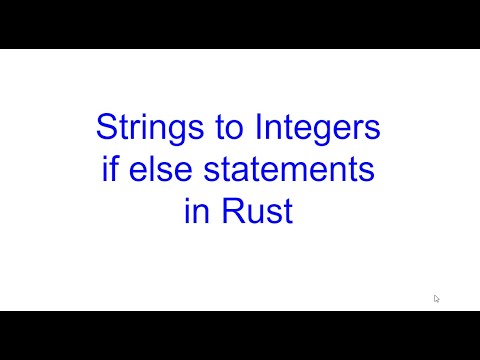
Found 25 images related to convert string to int rust theme
